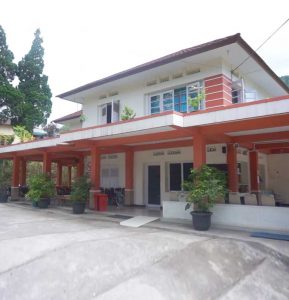B2P2TOOT: The Ministry of Health’s Spearhead in Research and Assessment on Medicinal Plants
"Indonesian people has used medicinal plants and jamu for hundreds of years. We can find books related to this ancestral heritage in several libraries, such as the Djampi Jawi book. To this day, this local wisdom is still ongoing and carried out by the community. To accommodate and preserve the heritage, B2P2TOOT under the Ministry of Health is ready to spearhead research and study of medicinal plants and jamu. "Published by : Kurnia HD - 20/05/2020 21:50 WIB
4 Minutes read.
The trend of ‘goes back to nature’ now popular also has an impact on health and medicine sides. People tend to choose safe treatments with natural ingredients rather than consuming chemical drugs deemed often have side effects.

Gedung B2P2TOOT
Fortunately, this trend is captured and taken seriously by the Ministry of Health through B2P2TOOT, as the only research and development institution for medicinal plants under the Ministry of Health. Referring to its function, B2P2TOOT conducts research and studies in the field of medicinal plants from upstream to downstream. It does not stop at research but also manages how research results are published and reach the public, so that they can be used by industry, society, and program managers.
“There are several B2P2TOOT functions, what we have been doing so far is referring to them. Among other things, the main thing is to conduct research and studies in the field of traditional medicinal plants, starting from planning, implementing, monitoring, then disseminating the formations into one compact activity. So, if it (the item of medicinal plants) has been researched, there are results, the evidence is then published and then turn this researched item into products that can be used by industry, society and program managers, “said Akhmad Saikhu.

hortus medicus clinic
Not only for the practical sides, the results of research conducted by B2P2TOOT could be the source of policy. Regarding the dissemination, B2P2TOOT does not only stop at journal publications and workshops but leads to analysis and policy recommendations for related governments.
“It could be that the results of our research here come out as a policy. Well, we have to convey this to the decision makers, namely the local government, provinces and others. Then in terms of dissemination, publication and research, it is also not only publication in journals, then dissemination of seminars, workshop. There is also an analysis of policy recommendations to the local government and so on.” Akhmad Saikhu continued
Until now, there has been no other institution formed by the Ministry of Health for medicinal plants research apart from B2P2TOOT in Tawangmangu, Karanganyar. In short, B2P2TOOT is the spearhead of the Ministry of Health for the research and development of medicinal plants in Indonesia.
“Up to now, the R & D institutions related to medicinal plants under the Ministry of Health is only here. B2P2TOOT is the only one in Indonesia. Actually, I talked to the UPT Litbangkes a lot. I said this is one of the UPTs, but the one engaged in traditional medicinal plants is only in Tawangmangu,” said Akhmad Saikhu.
The Ministry of Health does have several UPTs scattered from Sabang to Merauke to support its performance. Like the Research and Development Center in Salatiga, which deals with vectors and reservoirs of disease. Other Litbangkes which have duties and functions related to medicinal plants are the same as B2P2TOOT which are developed by the Regional Government, one of which is East Java.
“One of other research and development activities is in Salatiga, the field is not medicinal plants but related to disease vectors. Throughout Sabang to Merauke there are other UPTs as well. There are approximately 10 UPT. But if it is under the Regional Government, yes, probably many will develop it -like in East Java.”
Interestingly, B2P2TOOT does not want to be rigid in carrying out the tasks and functions of research and development activities at the research level. Topics related to medicinal plants are conveyed to the public in a fun way through scientific tours that are open to the public. So, more people will come and visit to study existing medicinal plants.

Medicinal plants showcase
“We are also developing scientific tourism. How can scientific topics related to medicinal plants be enjoyed as a tourist attraction too? The packaging is not only scientific but also has a fun side. Until now, we have received many visits from the community and students. Until today, there have been hundreds of people studying the medicinal plants here, “concluded Akhmad Saikhu.








